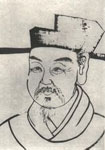“憑誰說與柳柳州”的意思及全詩出處和翻譯賞析
“憑誰說與柳柳州”全詩
只余架上萬天花,照影清池三兩曲。
江東詩仙花下飲,小摘繁枝篸醉玊。
驚飛雪片萬許點,亂落酒船百余斛。
舊枝掠削自縈回,新枝奔迸無拘束。
詩仙詩滿云夢胸,那更相逢此花觸。
只愁毛穎倦驅使,一月屢向陶泓浴。
兩章洗盡眼底塵,個字亦帶花邊馥。
憑誰說與柳柳州,休道一聲山水淥。
愿參佳句法如何,夜雨何時對床宿。
分類:
作者簡介(楊萬里)
《再和羅武岡欽巖酴醾長句》楊萬里 翻譯、賞析和詩意
《再和羅武岡欽巖酴醾長句》是宋代楊萬里創作的一首詩詞。以下是這首詩詞的中文譯文、詩意和賞析:
春風一夜吹滕六,
Spring breeze blows through the night, awakening the sixth month,
旋落旋銷不成簇。
Falling and dispersing, unable to form clusters.
只余架上萬天花,
Only countless flowers remain on the trellis,
照影清池三兩曲。
Reflecting their shadows in the clear pond, creating a serene scene.
江東詩仙花下飲,
The poet, a literary immortal from the eastern river, drinks beneath the flowers,
小摘繁枝篸醉玊。
Picking a few branches, intoxicated by their fragrance.
驚飛雪片萬許點,
Startled, snowflakes scatter in countless numbers,
亂落酒船百余斛。
Chaotically falling onto the wine boat, filling hundreds of measures.
舊枝掠削自縈回,
Old branches are pruned and entangled,
新枝奔迸無拘束。
New branches grow vigorously without restraint.
詩仙詩滿云夢胸,
The poet's heart is filled with poetic aspirations and dreams,
那更相逢此花觸。
Yearning for encounters with these flowers.
只愁毛穎倦驅使,
Only worried that the poet's inspiration may wane,
一月屢向陶泓浴。
So he repeatedly seeks inspiration from the famous poet Tao Hong.
兩章洗盡眼底塵,
Two chapters cleanse away the dust from his eyes,
個字亦帶花邊馥。
Each word carries the fragrance of the flowers.
憑誰說與柳柳州,
Who can convey my message to Liuzhou,
休道一聲山水淥。
Don't just mention the scenery with a single word.
愿參佳句法如何,
I hope to learn from excellent poetic techniques,
夜雨何時對床宿。
When will the night rain accompany me to sleep?
這首詩詞以描繪春天的景色為主題,通過描寫花朵、清池和酒船等元素,展現了春天的生機和美麗。詩人以自然景物為媒介,表達了自己對詩歌創作的渴望和追求。同時,詩中也透露出詩人對于詩仙的崇敬和向往,以及對于詩歌創作的堅持和不懈努力。整首詩詞以清新、明快的語言描繪了春天的景色,展示了詩人對于自然和詩歌的熱愛,給人以愉悅和賞心悅目的感受。
“憑誰說與柳柳州”全詩拼音讀音對照參考
zài hé luó wǔ gāng qīn yán tú mí cháng jù
再和羅武岡欽巖酴醾長句
chūn fēng yī yè chuī téng liù, xuán luò xuán xiāo bù chéng cù.
春風一夜吹滕六,旋落旋銷不成簇。
zhǐ yú jià shàng wàn tiān huā, zhào yǐng qīng chí sān liǎng qū.
只余架上萬天花,照影清池三兩曲。
jiāng dōng shī xiān huā xià yǐn, xiǎo zhāi fán zhī cǎn zuì sù.
江東詩仙花下飲,小摘繁枝篸醉玊。
jīng fēi xuě piàn wàn xǔ diǎn, luàn luò jiǔ chuán bǎi yú hú.
驚飛雪片萬許點,亂落酒船百余斛。
jiù zhī lüè xuē zì yíng huí, xīn zhī bēn bèng wú jū shù.
舊枝掠削自縈回,新枝奔迸無拘束。
shī xiān shī mǎn yún mèng xiōng, nà gèng xiāng féng cǐ huā chù.
詩仙詩滿云夢胸,那更相逢此花觸。
zhǐ chóu máo yǐng juàn qū shǐ, yī yuè lǚ xiàng táo hóng yù.
只愁毛穎倦驅使,一月屢向陶泓浴。
liǎng zhāng xǐ jǐn yǎn dǐ chén, gè zì yì dài huā biān fù.
兩章洗盡眼底塵,個字亦帶花邊馥。
píng shuí shuō yǔ liǔ liǔ zhōu, xiū dào yī shēng shān shuǐ lù.
憑誰說與柳柳州,休道一聲山水淥。
yuàn cān jiā jù fǎ rú hé, yè yǔ hé shí duì chuáng sù.
愿參佳句法如何,夜雨何時對床宿。
“憑誰說與柳柳州”平仄韻腳
平仄:平平平仄仄仄平
韻腳:(平韻) 下平十一尤 * 平仄拼音來自網絡,僅供參考;詩句韻腳有多個的時候,對比全詩即可判斷。
